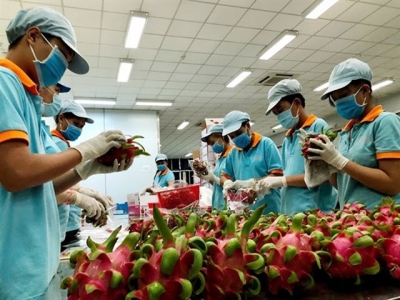Fruit and vegetable exports to China in danger during the Lunar New Year

Dang Phuc Nguyen, General Secretary of the Vietnam Fruit and Vegetable Association, said “that China intends to stop importing vegetables and fruits for at least 6 weeks during the upcoming Lunar New Year. This may increase the disruption of the global supply chain, greatly affecting Vietnam's fruit and vegetable exports.”
Dragon fruits Source: Internet
Export bottlenecks, growth slows down
On December 4, 2021, speaking in an online forum, Dang Phuc Nguyen, General Secretary of the Vietnam Fruit and Vegetable Association said, "According to newly received information, China intends to stop importing vegetables and fruits for at least 6 weeks during the upcoming Lunar New Year. This could increase disruptions to the global supply chain.” Therefore, Dang Phuc Nguyen wishes to increase the rate of domestic consumption in the coming months.
Another difficulty raised by Nguyen is that, due to the lack of deep processing, it is difficult for Vietnamese vegetables and fruits to serve markets with large geographical distances, by current means of low-cost transportation.
The General Secretary of the Vietnam Fruit and Vegetable Association, suggested promoting local produce according to GAP standards and linking cooperatives to improve production efficiency, along with negotiating to expand the list of fruit and vegetable products allowed to be exported to China and other global superpowers.
Vu Kim Hanh, Chairman of the Business Association of High Quality Vietnamese Products, also expressed concern that in the near future China will stop importing fruit products during the busiest fruit harvest period in Vietnam.
From the perspective of State management, Le Thanh Tung, Deputy Director of the Department of Crop Production (MARD) said, "by the upcoming Lunar New Year, the country's fruit output may reach more than 1.7 million tons. This is a number that needs to be calculated for consumption because it may be a bit congested in the current Chinese market."
Standards of the importer to be closely observed
Vu Kim Hanh claimed that China is the most important fruit import market of Vietnam, so it is necessary to produce according their standards, including GlobalGAP.
“Currently, Vietnam has a transit standard between VietGAP and GlobalGAP, which is LocalGAP. The LocalGAP standard represents most of the features of GlobalGAP, but the cost and implementation time is less than one third”, said the Chairman of the Vietnam Association of High Quality Products.
Vu Kim Hanh also said, “so far, 120 agricultural enterprises have been awarded LocalGAP certification. The localities of Ben Tre, Lam Dong and Nghe An have also signed contracts for the Association to advise on LocalGAP standards for fruit cooperatives in the province.
“We are building counseling programs for cooperatives about LocalGAP with low fees, even free for difficult business households. The goal of the Association is to create a "key", a "passport" for Vietnamese fruits to take firm steps into the international export market, with LocalGAP standards", said Hanh.
From the perspective of an export business, Ngo Tuong Vy, Deputy General Director of Chanh Thu Company, said, “the Chinese market is changing a lot in terms of imports. It can be said that this is a stepping stone for the entire agricultural industry, localities and businesses to change their thinking in agricultural production and business.
However, in the past, when the Chanh Thu Company participated in developing the area code for durian fruit, many localities were indifferent, leaving farmers to work with businesses. This is the wrong view, which needs to be changed from the locality within.
“Businesses can connect, purchase and consume, but the production orientation must involve the participation of localities. If this can be changed, then exports can prosper. In the near future, we will find clues that help us purchase products that are uniform and stable in both quality and output," said Vy. At the same time, he suggested to develop more quality standards so that Vietnamese vegetables and fruits can access more markets.
From the perspective of traceability and quality certification, according to Tung, specialized agencies and local management agencies need to accommodate businesses and farmers more.
“This is the main responsibility of management agencies like the Department of Agriculture and Rural Development, not the responsibility of enterprises. As is the construction of material areas and finding specific areas and special points to call for businesses to participate in consumption," said Tung.
Related news
 Vertical farming is headed for the ‘trough of disillusionment’
Vertical farming is headed for the ‘trough of disillusionment’ It’s October 15th, 2021 and my phone starts blowing up: “Did you see this!?” asks one vertical farming executive in a text.
 Building the brand for Vietnam's agricultural extension
Building the brand for Vietnam's agricultural extension On the road to building rural areas into a livable place, the Minister believes that the soft values from agricultural extension activities will create a new
 Ecological model reduces costs and improves landscapes
Ecological model reduces costs and improves landscapes Many farmers in the Mekong Delta region have implemented a 'rice fields with flower bank' model that helps to cut costs and beautify the sceneries of the rural